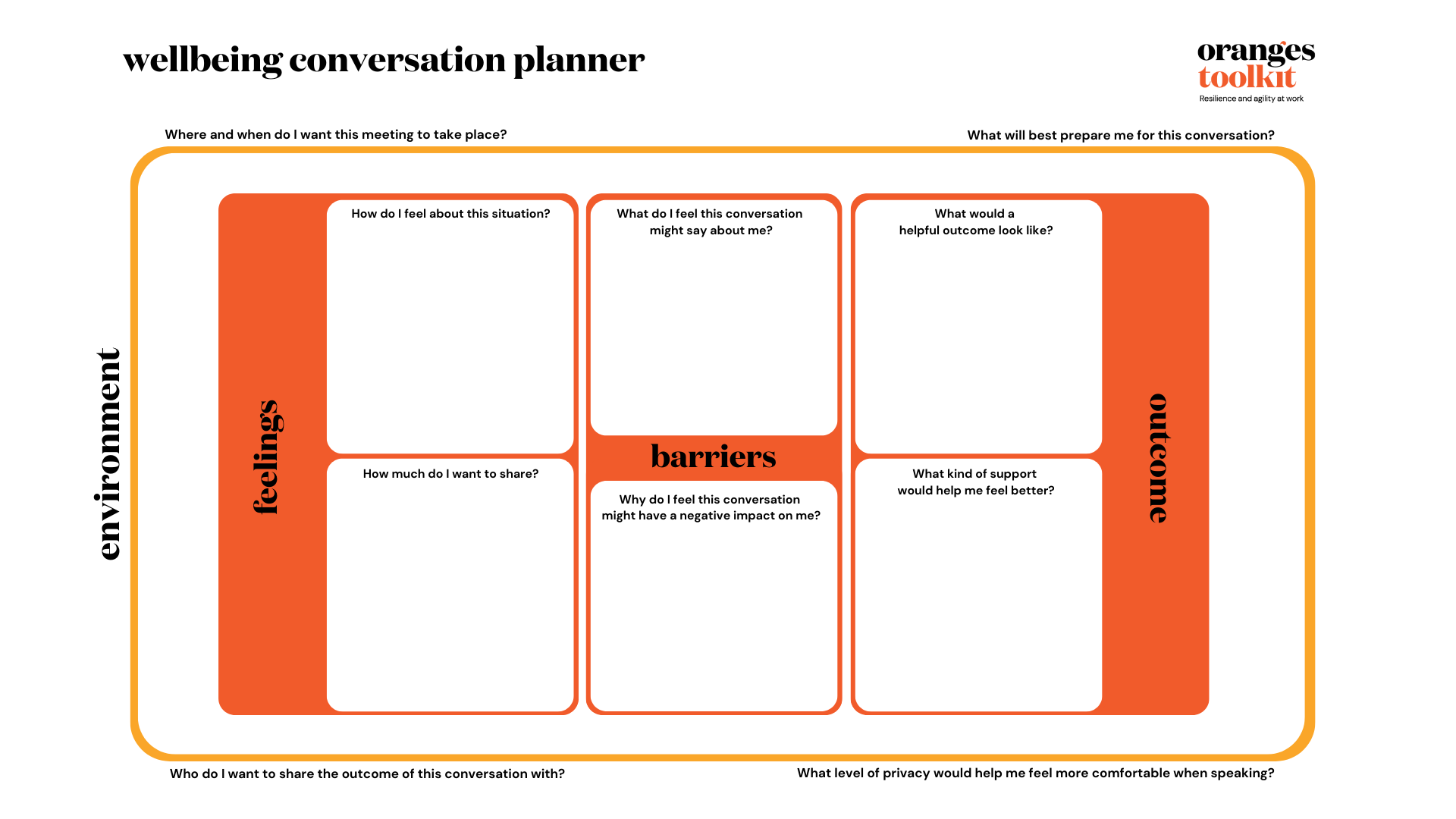Effective wellbeing conversations

Whether you’re feeling chipper or lacklustre, it can be a good idea to share how you’re feeling with those around you! Simply having a conversation about how you’re feeling and the state of your wellbeing at work can be a powerful step towards improving your wellbeing and performance. Not only might you feel better ‘getting it off your chest’, but you may also contribute to building awareness and wellbeing literacy of others in your organisation, and open the potential for positive action and support.
It may not feel easy to do
Starting a wellbeing conversation at work is a great way to help your leader know how they can support you and enable you to perform at your best. Having conversations with your manager or colleague might not always be easy. You might be worried about negative responses or feel vulnerable about being treated differently after the conversation. You might even feel hesitant because you are unsure on how to approach the situation.
As always, remember that there is a wide range of emotions that you may be feeling as you continue to face the ups and downs of daily life. If you or someone you know needs extra support, we recommend contacting your workplace Employee Assistance Program (EAP), a qualified health practitioner, or: Lifeline: 13 11 14, Beyond Blue: 1300 224 636.

Why it's important to plan a wellbeing conversation
Taking the lead and having a conversation about your wellbeing can help build an honest and open culture around you. Talking can also be a great form of emotional relief.
In many cases, conversations are not only a way of sharing your experiences with others, they can also induce changes in different networks in your brain. Sometimes, having healthy, trusting conversations can boost the release of certain hormones and stimulate systems that can change your body’s chemistry.
Through conversations that are planned to cooperatively tackle challenges, you can activate an appreciative mindset, changing your predisposition to receiving feedback, and thus experiencing a change in your neurochemistry. With open and honest conversation, you can also reduce the threat-based messages from the amygdala – a region in the brain that plays an integral role in our emotional reactivity - and ignite pathways that are associated with an area of the brain known as the pre-frontal cortex, or PFC. The PFC is a key driver to your executive functioning, strategic planning, problem-solving, decision making, paying attention and regulating your emotions. It may be helpful to think about this region of the brain as being your emotional filter.

How to plan for a wellbeing conversation
Before diving right into a wellbeing conversation, it may be helpful to plan it, especially because not all workplaces and leaders are the same. Some of us might be part of a big team, while others may work in a small organisation, some might have daily interactions with their manager, whereas others may not be in routine contact with them. There is no one-size-fits-all when it comes to wellbeing in the workplace, so you may want to reflect on how the tips offered in this article might translate in your own work environment.
The main idea behind a wellbeing conversation is to take the initiative to better take care of yourself, and even those around you. The wellbeing conversation planner is a tool to help identify how you are feeling about the chat you are willing to have with your manager. So, let’s look at a few helpful steps to plan a wellbeing conversation.
Four focus areas of the conversation planner
The environment: Thinking about your working environment is a crucial step to prepare yourself for the conversation. There are four main questions you might want to ask yourself to help you prepare for the chat.
- Where and when do you want this meeting to take place? This is the setting that would feel most comfortable for you and your manager (e.g. in the office, outside the office, online, face-to-face). Having an ‘off-the cuff’ conversation in the hallway may not be conducive to the response you’re after.
- What will best prepare you for this conversation? This can be any self-care activities that you might want to do in preparation for the conversation (e.g. meditation, going for a walk outside, or chatting with a friend or family member). You might also like to think about when your manager is ‘at their best’. i.e. If you know they are more receptive in the morning, see if you can book time with them then.
- What level of privacy would help you feel more comfortable during the conversation? This can be discussed with your manager before having the actual conversation. It may also be helpful to give your manager a heads up that you’d like to discuss ways to help you perform at your best.
- Who do you want to share the outcome of this conversation with? It is important to have a plan in place for after the conversation. Whether the outcome is positive or more challenging than you expected, it might be useful to have a safe place and a close person to talk to.
Your feelings: Our feelings and emotions play a huge part in our daily lives, more than we may realise. Understanding how you feel about the situation, your manager and the conversation itself can be extremely helpful. Here are a few questions that might help you gain greater clarity about how you feel, and importantly, the why behind your feelings.
- How do you feel about this situation? When you think about your wellbeing, what words or emotions come to mind? Take a moment to reflect on why these words/emotions came up for you.
- How much do you want to share? Sometimes there may be factors outside of your work that impact your wellbeing, i.e. Caring for an elderly parent, or navigating a separation. You might want to consult with a friend or family member first to help decide what boundaries to set.
The barriers: Ideally, wellbeing conversations happen regularly and in a proactive environment, however that doesn’t always happen. Sometimes conversations ‘fester’ because we’re unsure how they will play out – this can often result in ‘small niggles’ becoming ‘bigger issues’ that are more impactful on our wellbeing, performance and relationships.
Here are a couple of questions that might support you to overcome any barriers to a wellbeing conversation:
- What do you feel this situation might say about you? What worries you about having the conversation?
- Why do you feel this situation might have a negative impact on you or your manager?
- Now ask yourself – what is the likely outcome of you not having the conversation?
The outcome: When starting a wellbeing conversation, it can be helpful to think about your desired outcome, what you would like to see change, and what you would like to see stay the same. It can also be helpful to think about how your manager may respond, this way you can practise what you might say before you dive in. Importantly, when you think about your ideal future state, try not to ‘fixate’ on how it will look and how you think your manager will respond.
If it’s the first time you have had a wellbeing conversation with your manager, they may be surprised or not aware of how you were feeling, so aim to be open and curious during this meeting, understanding that you may not have ‘a resolution’ at the end, but rather an ongoing conversation to step you closer to your ideal state.
These are a few helpful questions to think about:
- What would the ideal change look like? i.e. Would more flexibility help, or maybe the workload is negatively impacting you? And how do you feel about the conversation itself?
- What would a helpful outcome look like?
- What kind of support would help you feel better?

Need support to enhance employee wellbeing?
Get in touch to let us know and explore how we can work together.
Seek help when it's needed
The Oranges Toolkit offers a range of science-based workplace wellbeing programs focusing on practical actions you can take to build resilience, energy, and emotional agility.
Remember there is help all around. If you or someone you know needs extra support, we recommend contacting your workplace Employee Assistance Program (EAP), a qualified health practitioner, or:
- Lifeline: 13 11 14
- Beyond Blue: 1300 224 636
